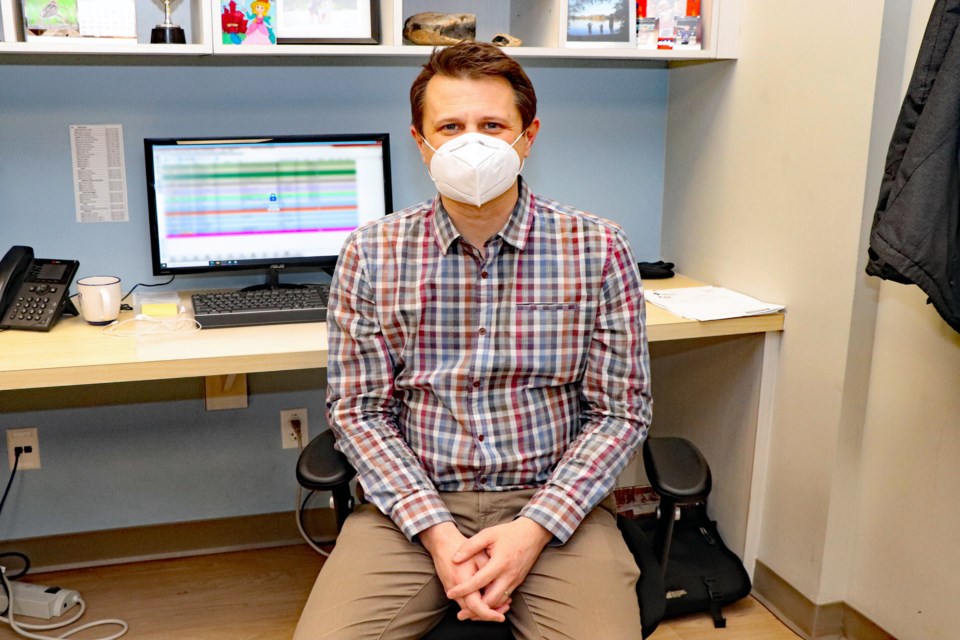INNISFAIL – The province is promising huge financial incentives to attract doctors to rural communities but there’s no joy in Innisfail.
Instead, there’s new concern that if the provincial government does not reach out to key stakeholders, Innisfail’s ‘worrisome’ situation will encounter a “crisis” point already impacting other communities.
“We don’t want to get into a position of crisis like a lot of these other places before it gets addressed,” said Dr. Jesse Christiansen, family physician at the Innisfail Medical Clinic.
Christiansen has been a leading regional medical profession spokesperson and vocal critic of the provincial government since 2020 when the fight for a new contract between the Alberta Medical Association (AMA) and province was at an early boiling point.
“We want to make sure the needs of Innisfail are being looked at as well, and not just communities that are at a crisis point,” he said. “We want to make sure we’re addressing these well before we get to that place.”
On Jan. 31, Alberta Health Minister Jason Copping announced the Rural Education Supplement and Integrated Doctor Experience (RESIDE) program, which will see $6 million spent over the next three years to bring 60 new family physicians to rural Alberta.
The three-year program, which will support 15 rural communities in the first year, will provide $60,000 toward undergraduate tuition fee reimbursement, and a remote community incentive ranging from $20,000 to $40,000 depending on the community’s location. Innisfail is not on the list.
Christiansen said while the announcement was “positive” by moving in a direction where the provincial government realizes that rural medicine is “in trouble”, it was still “disappointing” to note that conversations occurred two years ago about government changes without consultations.
“We were saying, ‘this is going to be a big issue’. A lot of the communities on that list were struggling before. I know several of them have lost physicians in the last two years, specifically because of the initiatives the government was undertaking,” said Christiansen, who called Innisfail’s current physician shortage “worrisome".
He estimated Innisfail, based on the four doctors it recently lost, has about 3,000 to 5,000 citizens who don’t have a family physician. He said the town now has about 11 doctors, with some splitting practices and not working full-time.
Christiansen added the recent losses will probably leave the town about three to five doctors short of what’s needed to adequately serve the community.
“It (RESIDE) is throwing money at a problem but it’s also an issue of a significant lack of consultation with the people who are going to be using the programs and trying to recruit people through these programs,” said Christiansen, adding Innisfail and other key stakeholders were not contacted for input.
“How the president of the section of rural medicine for the AMA is not involved in those discussions. I don’t understand that.”
On Jan. 31, Dr. Samantha Myhr, president of the rural medicine section for the Alberta Medical Association, said on Twitter she only learned about the announcement of the new program through social media.
“As the representative for rural docs in this province I am disappointed to find out about this announcement via Twitter. Rural challenges require broad stakeholder input to be successful. As always, I am here to help. Please take it,” said Myhr on her own Twitter account.
Mayor Jean Barclay, who has been a strong advocate for maintaining quality healthcare in the community, said she has not yet seen the fine details of the RESIDE plan.
However, Barclay, emphasizing physician attraction to rural Alberta is an old and ongoing problem, said the provincial government’s approach should also include more dialogue with all communities, their health care professionals and local stakeholders to better understand the needs of each one.
“I am not exactly sure of numbers but I believe we are certainly short of physicians here, and its certainly not through a lack of trying from the local medical clinic,” said Barclay. “There needs to be a much deeper dialogue with the healthcare community and what they need and how we attract the healthcare professionals into our community. What can we do to support that?”
Innisfail has been a provincial leader with implementing ground-breaking well-being programs. The town’s Community Partners in Action, which included the Wolf Creek Primary Care Network, Alberta Health Services, FCSS and the Town of Innisfail, earned a RhPAP Rhapsody Health-Care Heroes Award in 2021 for its Dementia Friendly Initiative.
“I think Innisfail has had a lot of success in the last few years implementing programs in the community, not necessarily recruiting physicians but by integrating the medical clinic, AHS staff, and the primary care network,” said Christiansen, adding there’s also been “significant buy-in” from local politicians, businesses and community groups to address the needs of the community by working together.
“That is how you are going to get long-term solutions to these problems, is having all the stakeholders in the community involved in these discussions.”



